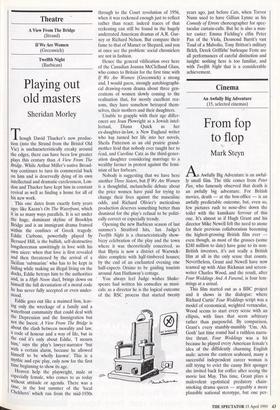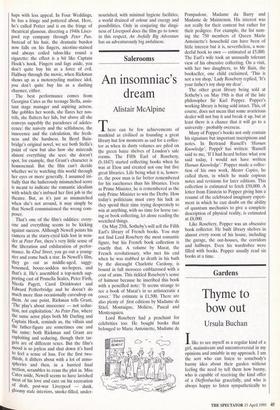Cinema
An Awfully Big Adventure (15, selected cinemas)
From fop to flop
Mark Steyn
An Awfully Big Adventure is an awful- ly small film. The title comes from Peter Pan, who famously observed that death is an awfully big adventure. For British movies, death — at the box-office — is an awfully predictable outcome, but, even so, few pictures rush to nose-dive down the toilet with the kamikaze fervour of this one. It's almost as if Hugh Grant and his director Mike Newell felt the need to atone for their previous collaboration becoming the highest-grossing British film ever — even though, as most of the grosses (some $240 million to date) have gone to its non- British investors, it's not really a British film at all in the only sense that counts. Nevertheless, Grant and Newell have now teamed up with Alan Rickman and screen- writer Charles Wood, and the result, after Four Weddings And A Funeral, is four lem- mings at a urinal.
This film started out as a BBC project and it shows in the dialogue: where Richard Curtis' Four Weddings script was a model of economical, weighted vernacular, Wood seems to start every scene with an ellipsis, with lines that seem arbitrary rather than purposeful. By comparison, Grant's every stumbly-mumbly 'Urn. Ah. Gosh' last time round had a ruthless narra- tive thrust. Four Weddings was a hit because he played every American female's idea of the diffidently charming English male: across the eastern seaboard, many a successful independent career woman is still trying to evict the canny Brit sponger she invited back for coffee after seeing the movie last May. This time, Grant plays a malevolent egotistical predatory chain- smoking drama queen — arguably a more plausible national sterotype, but one per- haps with less appeal. In Four Weddings, he has a fringe and pottered about. Here, he's called Potter and is on the fringe of theatrical glamour, directing a 1940s Liver- pool rep company through Peter Pan. Instead of his hair, the dramatic burden now falls on his fingers, nicotine-stained and always coiled talon-like round a cigarette: the effect is a bit like Captain Hook's hook. Fingers and fags aside, you don't quite buy his as a force of evil. Halfway through the movie, when Rickman shows up as a motorcycling matinee idol, you don't quite buy his as a dashing charmer, either.
The best performance comes from Georgina Cates as the teenage Stella, assis- tant stage manager and aspiring actress. She gobbles her words, she flares her nos- trils, she flutters her lids, but above all she conveys superbly the paradoxes of adoles- cence: the naivety and the selfishness, the innocence and the calculation, the fresh- ness and the hardness. In Beryl Bain- bridge's original novel, we see both Stella's point of view but also how she misreads almost everything she sees: she doesn't spot, for example, that Grant's character is homosexual. But the film can't decide whether we're watching this world through her eyes or more generally. I assumed ini- tially that the ludicrously mismatched score is meant to indicate the romantic idealism with which she's imbued her first job in the theatre. But, as it's just as mismatched when she's not around, it may simply be that Newell commissioned the wrong com- poser.
That's one of the film's oddities: every- one and everything seems to be kicking against success. Although Newell points his camera at the starry-eyed kids lost in won- der at Peter Pan, there's very little sense of the liberation and exhilaration of perfor- mance. In 42nd Street, you go out a young- ster and come back a star. In Newell's film, they go out as middle-aged, saggy- bosomed, booze-sodden no-hopers, and that's it. He's assembled a top-notch sup- porting cast of Prunella Scales, Peter Firth, Nicola Pagett, Carol Drinlcwater and Edward Petherbridge and he doesn't do much more than occasionally eavesdrop on them. At one point, Rickman tells Grant, 'The play's about innocence — not seduc- tion, not exploitation.' As Peter Pan, where the same actor plays both Mr Darling and Captain Hook, reminds us, the villain and the father-figure are sometimes one and the same: both Rickman and Grant are exploiting and seducing, though their tar- gets are of different sexes. But the film's mood is so joyless and shut down it's hard to feel a sense of loss. For the first two- thirds, it dithers about with a lot of atmo- spherics and then, in a hurried final section, scrambles to cram the plot in. Miss Cates aside, Newell seems to have lavished most of his love and care on his recreation of drab, post-war Liverpool — dank, gloomy stale interiors, smoke-filled, under- nourished, with minimal hygiene facilities, a world drained of colour and energy and possibilities. Only in conjuring the dingi- ness of Liverpool does the film go to town: in this respect, An Awfully Big Adventure has an adventurously big awfulness.



























































 Previous page
Previous page